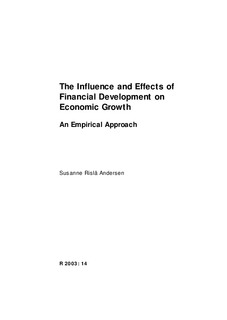| dc.contributor.author | Andersen, Susanne Rislå | |
| dc.date.accessioned | 2008-02-25T09:16:23Z | |
| dc.date.accessioned | 2017-03-29T09:13:25Z | |
| dc.date.available | 2008-02-25T09:16:23Z | |
| dc.date.available | 2017-03-29T09:13:25Z | |
| dc.date.issued | 2003 | |
| dc.identifier.isbn | 82-8062-068-0 | |
| dc.identifier.issn | 0805-505X | |
| dc.identifier.uri | http://hdl.handle.net/11250/2436131 | |
| dc.description.abstract | The financial sector plays an important part in economic growth as it can reduce the cost of acquiring information, conducting transactions and facilitating saving mobilisation. By providing these services, the financial sector can enhance resource allocation and increase aggregate savings. This report examines the empirical relationship between financial development and economic growth and to what extent this relationship differs across group of countries.
The analyses are based on three indicators which measure the financial sector by size (liquid liabilities) and activity (credit provided to private sector and credit by banks). The employed data set includes a representative selection of 60 countries over the period 1965-1997.
The analysis concludes that i) a positive statistical relationship exists between financial development and economic growth; and ii) developing countries grow faster than industrialised countries (some evidence of convergence). Financial sector developments therefore seem to have at least the same importance in developing countries as in industrialised countries. | |
| dc.language.iso | eng | |
| dc.publisher | Chr. Michelsen Institute | |
| dc.relation.ispartofseries | Research report | |
| dc.relation.ispartofseries | R 2003: 14 | |
| dc.subject | Economic growth | |
| dc.subject | Developing countries | |
| dc.subject | Econometrics | |
| dc.subject | Financial sector | |
| dc.title | The Influence and Effects of Financial Development on Economic Growth. An Empirical Approach | |
| dc.type | Research report | |
